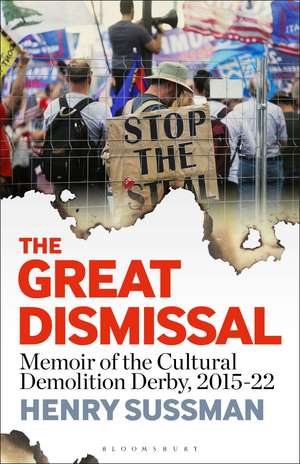The Great Dismissal: Memoir of the Cultural Demolition Derby, 2015-22
Autor Henry Sussmanen Limba Engleză Hardback – 25 ian 2023
| Toate formatele și edițiile | Preț | Express |
|---|---|---|
| Paperback (1) | 136.27 lei 3-5 săpt. | +28.81 lei 7-13 zile |
| Bloomsbury Publishing – 25 ian 2023 | 136.27 lei 3-5 săpt. | +28.81 lei 7-13 zile |
| Hardback (1) | 376.91 lei 6-8 săpt. | +46.65 lei 7-13 zile |
| Bloomsbury Publishing – 25 ian 2023 | 376.91 lei 6-8 săpt. | +46.65 lei 7-13 zile |
Preț: 376.91 lei
Preț vechi: 495.74 lei
-24% Nou
Puncte Express: 565
Preț estimativ în valută:
72.12€ • 75.57$ • 59.62£
72.12€ • 75.57$ • 59.62£
Carte tipărită la comandă
Livrare economică 12-26 aprilie
Livrare express 08-14 martie pentru 56.64 lei
Preluare comenzi: 021 569.72.76
Specificații
ISBN-13: 9781501392290
ISBN-10: 1501392298
Pagini: 304
Dimensiuni: 140 x 216 x 25 mm
Greutate: 0.5 kg
Editura: Bloomsbury Publishing
Colecția Bloomsbury Academic
Locul publicării:New York, United States
ISBN-10: 1501392298
Pagini: 304
Dimensiuni: 140 x 216 x 25 mm
Greutate: 0.5 kg
Editura: Bloomsbury Publishing
Colecția Bloomsbury Academic
Locul publicării:New York, United States
Caracteristici
Couches the impact and significance of events we've all been through - far right triumphs in elections and referendums, anti-science misinformation and sentiments (including in connection to the pandemic), police violence - in a narrative that demonstrates the relevance and flat-out indispensability of the humanities, including such approaches as deconstruction, psychoanalysis, systems theory, and object-relations theory
Notă biografică
Henry Sussman retired in 2017 as Professor of Germanic Languages and Literature at Yale University, USA, after a 45-year teaching career. He is the author of 11 books, including Around the Book (2011), The Aesthetic Contract (2007), Psyche and Text: The Sublime and the Grandiose in Literature, Psychopathology and Culture (1993), and High Resolution: Critical Theory and the Problem of Literacy (1989). He has edited five volumes, including Acts of Narrative, co-edited with Carol Jacobs (2003). He is the founder and co-editor of the curated, theory-driven weblog, Feedback (www.openhumanitiespress.org/feedback). Professor Sussman is currently Visiting Professor of German at Rutgers University, USA.
Cuprins
1. November 18, 2020. Postal. 2. October 6, 2020. Apocalypse red, apocalypse blue. 3. December 12, 2020. Confederacy of zombies. 4. October 18, 2019. Protests, curtailment of bus service, Queens. 5. June 7, 2020. Atlas of vanished places. 6. February 10, 2021. Requiem to disinterest. 7. January 27, 2020. New feudal lords. 8. Thanksgiving, 2021. Partisans of writing: Mayer with Derrida 9. April 1, 2018. Welcome to the Great Dismissal! 10. August 15, 2020. Co-lateral dommages. 11. December, 31, 2020. What on earth to do with the bodies? 12. August 30, 2018. Midterm enigmas for progressives. 13. December 15, 2021. Partisans of writing. Tobin Smith. 14. January 19, 2021. Politics of entertainment 15. May 24, 2020. Sikhs and other cabbies. 16. November 15, 2020. Electronic ticks and leaden bubbles. 17. June 13, 2019. Three deer in a development near Harrisburg, PA. 18. Labor Day, 2021. Partisans of writing. Shoshanah Zuboff. 19. March 15, 2022. Partisans of writing. Adam Serwer. 20. February 14, 2022. University of the street. 21. May 15, 2022. This Thing that dwells within us. 22. June 27, 2022. Dismissal day: The strange loop of identity politics. 23. January 23, 2023. I was there.
Recenzii
This book establishes a new critical standard for memoir. The Great Dismissal demolishes efforts to expunge controversial books from our society simply because they induce people to think. Through an improvised mash-up of original poetry, trenchant cultural analysis, and touching memoir, Sussman's amazing book is an electroshock to the deadened brain of America. This kaleidoscopic survey of life during the Trump-COVID years from one of Derrida's most celebrated students is an extremely important and highly original work of social and political criticism. A must read for anyone who wants to make thinking great again!
In The Great Dismissal, Henry Sussman crafts an extraordinary voice meticulously registering the existential vagaries of life in New York City during the twin plagues of COVID and Trump. This intimately personal, nonlinear chronicle foregrounds contemporary journalism that challenges the mendacity, hypocrisy, and subterfuge of American political culture. The Great Dismissal is a sustained meditation on intellectual redemptions that refuse to be dismissed by the Pharisees of disinformation.
No one today writes - or thinks - quite like Henry Sussman. A rhizomatic memoir of the Trump era, The Great Dismissal reads as a critique of the present penned simultaneously from the future and past. Pulling from Piketty and Poe and conversations in the street with equal attentiveness, Sussman offers a vibrant, searing, subjective answer to the still critical questions: What is to be done, and Who is to blame? The passion of the prose itself models an alternative - an irrational but inexhaustible, perennial hope - to the post-apocalyptic global present he so skillfully scalpels apart.
In The Great Dismissal, Henry Sussman crafts an extraordinary voice meticulously registering the existential vagaries of life in New York City during the twin plagues of COVID and Trump. This intimately personal, nonlinear chronicle foregrounds contemporary journalism that challenges the mendacity, hypocrisy, and subterfuge of American political culture. The Great Dismissal is a sustained meditation on intellectual redemptions that refuse to be dismissed by the Pharisees of disinformation.
No one today writes - or thinks - quite like Henry Sussman. A rhizomatic memoir of the Trump era, The Great Dismissal reads as a critique of the present penned simultaneously from the future and past. Pulling from Piketty and Poe and conversations in the street with equal attentiveness, Sussman offers a vibrant, searing, subjective answer to the still critical questions: What is to be done, and Who is to blame? The passion of the prose itself models an alternative - an irrational but inexhaustible, perennial hope - to the post-apocalyptic global present he so skillfully scalpels apart.
